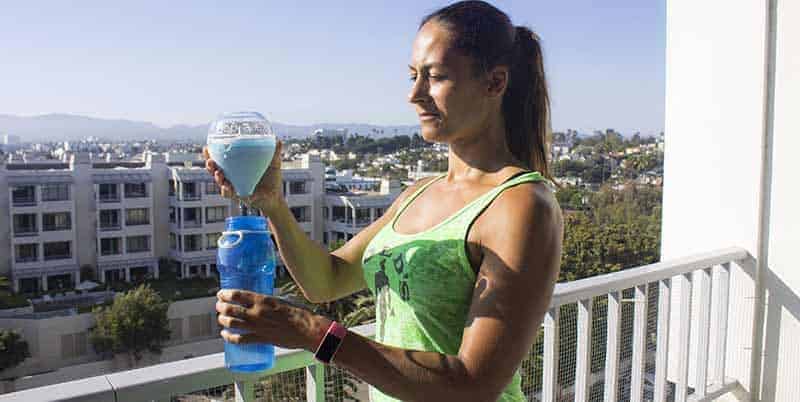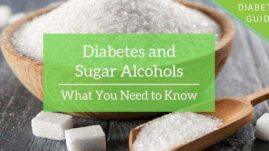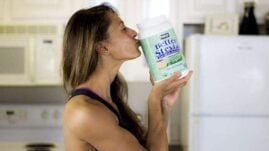Staying hydrated is important for everyone — especially considering that water makes up more than half of the human body!
“60 percent of our body is composed of water, 75 percent in our muscles, 85 percent in our brains, it’s like oil to a machine,” explained Dr. Roberta Lee at Medicine Daily.
As people with diabetes, drinking enough water is especially crucial. Even a little dehydration during the day (which is easier than we realize) can impact our blood sugars.
This article will explain how dehydration affects blood sugar levels, how much water we should drink each day, who should limit their water intake, and what else you can drink if you don’t want to just drink plain water.

How water impacts your diabetes
Quite simply, when you don’t drink enough water, the glucose in your bloodstream becomes more concentrated. And that leads to higher blood sugar levels. Both mild and severe dehydration can have a notable impact on your diabetes.
Even a mild level of dehydration — something you may not even feel — could easily leave your blood sugar levels 50 to 100 mg/dL higher than if you were drinking enough water.
If you’re consistently dehydrated on a daily basis, you might even be compensating with higher insulin levels than you’d need if your body was getting the water it needed.
More severe levels of dehydration, on the other hand, can drive blood sugars very high very quickly. For example, repeated vomiting from food poisoning or a stomach virus can lead to very sudden high blood sugar levels. But after an IV of fluids at the emergency room, you’ll likely see your blood sugar drop quickly towards normal levels without additional insulin.
It’s the simple issue of severe dehydration causing the glucose in your bloodstream to become extremely concentrated, and then quickly diluting it with plenty of fluids.
Almost every process in your body relies on water
Water actually does far more for our bodies than we realize. Water aids your digestion, lubricates joints, helps flush waste products, and performs a host of other important tasks in your body. Not being properly hydrated will significantly reduce your physical capacity and brain function.
According to Harvard University, adequate water intake is vital for a variety of daily functions within our body:
- carries nutrients and oxygen to cells throughout your body
- flushes bacteria from your bladder
- aids in the digestion of meals
- prevents constipation
- normalizes your blood pressure
- maintains a stable heartbeat
- cushions your joints
- protects your organs and tissues from a variety of potential damage
- regulates your body temperature
- maintains your body’s electrolyte/sodium levels
Water has been pinpointed in many studies as an important part of losing weight, but researchers still aren’t clear how it’s accelerating your weight-loss efforts.
Theories behind water consumption and weight loss include:
- Drinking more water means you’re likely drinking less soda and other sugar-laden beverages
- Drinking more water might boost your metabolism and cause you to burn more calories
- Drinking more water might help reduce cravings for not-so-healthy foods
- Drinking more water in place of diet soda may reduce insulin resistance
Regardless, it is clear in study after study that those who drink more water tend to lose more weight, in contrast, to study participants drinking less water.
Drinking enough water impacts so many aspects of our daily health. But how much water is enough?
How much water should people with diabetes drink each day?
There is no definitive rule for how much water you should drink, but there are guidelines we can follow.
The most important recommendation is that you should always have water available and drink whenever you feel thirsty. You don’t need to force yourself to drink water to reach some specific goal, but try to drink water continuously throughout the day.
Even if you don’t feel thirsty, you should try to take a few sips of water every hour to keep hydrated. The thirst reflex isn’t always perfect, especially for people with diabetes, so it’s better to proactively drink a little water than risk dehydration.
The average non-diabetic is advised to drink 8 glasses of water per day, so a person with diabetes should certainly take that to heart. While our insulin-producing friends need plenty of water, too, the consequences of mild dehydration in those of us with diabetes are more obvious in our blood sugar levels.
8 glasses of water per day add up to about 2 liters of water (67 ounces or just over half a gallon). It sounds like a lot — but you can make it feel more doable by choosing a medium-sized reusable beverage container and determining how many times per day you need to fill it to reach 2 liters.
If you’re exercising or battling the heat of summer, that number increases quickly.
“But even a healthy person’s water needs will vary,” adds Harvard, “especially if you’re losing water through sweat because you’re exercising, or because you’re outside on a hot day.”
Harvard research says the general rule of thumb for healthy individuals on a hot day or during exercise is to drink two to three cups per hour to compensate for water lost through sweating.
Who should limit their water intake?
“It’s possible to take in too much water,” explains Harvard research.
Certain health conditions can mean that too much water is actually taxing on your body. These conditions and medications mean you should talk to your doctor about the right amount of daily water for your body:
- Kidney disease or other kidney conditions
- Thyroid disease
- Liver issues
- Heart conditions
- Medications that cause water retention
- Non-steroidal anti-inflammatory drugs (NSAIDs)
- Some antidepressants
- Opiate pain medications
Good alternatives to plain water
Most sugar-free non-calorie beverages are good alternatives to plain water. This includes:
- Flavored or infused water
- Sparkling water
- Unsweetened tea
- Diet soda (in limited amounts)
Coffee in small amounts is also hydrating, as the diuretic effect of coffee (making you urinate more) is less than the amount of liquid you drink.
A note on diet soda
Some research studies point to a link between insulin resistance, weight gain, and frequent consumption of diet soda.
As one study from the United Kingdom concluded, “Replacement of [diet beverages] with water after the main meal in women who were regular users of [diet beverages] may cause further weight reduction during a 12-month weight maintenance program. It may also offer benefits in carbohydrate metabolism including improvement of insulin resistance over the long-term weight maintenance period.”
However, other studies have not found the same effects of diet soda so it’s probably safe to consume diet soda in limited amounts.




Blossom
Very informative for me….i learned a lot as a diabetic for over 7 years…encouraging to continue the fight
Judy G
Hello,
I am diabetic type two for close to 15 years. I am a frontline worker as a PSW in longterm care home….I feel most days under a lot of stress….and I always hear that stress can increase your blood sugar. I was overweight at the being of my diabetes. I have lost and maintained approx. over 40 pounds. I am 54 (5 foot 5) and weigh 138. I have a step counter and do approx 11,000 to 14,000 per day. I am on metformin 500g x2 morning then at night time, januvia once a day….but recently my blood sugars had started to climb because increased stress levels which I am trying my best to control. My doctor recently this Monday took me off of Januvia and started me on Ozempic I’ve been on Ozempic for two months and started out .25 every Monday for one month then increased it to .50 and just last week the pharmacy called my doctor to ask why I am taking Januvia and Ozempic at the same time….so my doctor discontinued my Januvia and increased my Ozempic to1mg every Monday. I also take cinnamon, garlic, cod liver oil, one cholesterol pill and One high blood pressure pill and baby aspirin 81. Now taking me off of the Januvia made me very stressed that maybe my sugars might spike up….my sugar this morning was 8.4….I drink a lot of water but I am having a hard time with what to properly eat. My doctor says I’m not eating enough food….I am afraid to eat anything and feel Hungry and stressed out when my sugars go up. I am constantly read what is the proper food or meals for diabetics type two and it makes me more confused….it’s there a site that says plain….these are the things you can eat and these are the things you cannot eat. I know everyone is different….but it is all very confusing….I want to live a long happy, healthy and full life….but I am simply stressed.
please help….thank you for listening.
Cheers Judy
Christel Oerum
Hi Judy – how you successfully manage your blood sugar will change over time. You might need different doses or different meds. So if you’re blood sugars are running higher than you like with the current medication regime, that doesn’t mean that you’re failing, but rather that it needs to be adjusted to your body’s current needs. I’ve found that a good way of working with a medical team is to take detailed notes on blood sugars, stress, food, and medication, analyze it and bring that to your doctor. If you go in and explain that you’re running high in the morning and then show your doctor the data, it will be easier for him/her to make informed adjustments
Judy G
Thank you for your advise….it’s hard to get into the doctors during covid and working in LongTerm care….would you have a good site that I can look at for meal planning or a site that tells me the best foods to eat and not to eat. Just want to know the best food to eat for breakfast, lunch and dinners…oh and snacks too ?
Thank you again for your advise….I really appreciate it.
Cheers Judy
Judy G
Just wondering if a protein shake once every few days is for me to add to my meals…is this a good brand…. MET-Rx Protein Plus Powder,
Christel Oerum
I really like that brand. It’s the only one I’ve stuck with for more than 5 years now
Christel Oerum
I would consider a telemedicine visit, just given the world situation.
There’s no such thing as a diabetic diet, so I can’t give you a definitive answer on what to eat. You can look at our meal plans here on the site (https://diabetesstrong.com/category/diet/meal-plans/) and check out my interview with RD Toby Smithson on YouTube (https://youtu.be/j49XQStTfKo)
diane van hassel
I am a recently diagnosed Type II, after being diagnosed with NASH and NAFLD. I was also badly overweight (200 lbs for 5’6 frame). I have lost 35 pounds of a total goal of 50 pounds to lose since early august 2020, and have gone from an almost size 20 to a size 14. my most recent A1c is 5.7; my liver enzymes are now back to within handshaking distance of normal (YAY!), and the latest liver sonogram I had (a month ago) is showing that almost all the fatty infiltrate and scar tissue has reversed. I am doing this totally through diet (1100 cal low carb), I do not take any medication at all. The problem I have is that frequently my blood sugar drops down to the low 60’s (or even 50’s) 3-6 hours after I eat. I generally eat approx 350 cals and 35 carbs at each meal. I have a snack after I work out in the gym because the BS really drops then (understandably). Why am I having these drastic drops every day, and what can I do to control the blood sugar more effectively?
Christel Oerum
Congrats on your progress! If your blood sugars drop that low and you’re not taking any medication I’d recommend you consult your doctor. Your doctor might just consult you to eat a little (such as a glucose tablet) when your blood sugar gets that low
nancy
i have type 2 can i drink coffee and what fruits and vegtable good for me and can i need beef thanks nancy
Christel Oerum
I don’t believe there’s anything you can’t eat with diabetes but there might be foods that you want to limit or only enjoy occasionally. Your glucose meter will be a great way of assessing whether a food (and the amount) works for your body. If your blood sugar isn’t back in your desired range after ~2 hours the type of food or amount you’re eating might not work for you.
You can read more about vegetables, carbohydrates, and protein (which includes meat) here:
https://diabetesstrong.com/low-carb-vegetables/
https://diabetesstrong.com/the-best-high-protein-foods-including-recipes/
Myra
I been diagnosed with type 2. What is the average amount of water should I drink. Is it ok for me to exercise. I’m 55 . I walk 30 minutes a day in the trade mill is that good or bad or do I need more exercise? If your blood sugar is high does that cause your pressure level to be high as well. I’m on Metphormine 2x daily @ 500mg a day and 5mg of Lisinipril
Christel Oerum
Hi Myra – as discussed in the article water needs can differ significantly so there’s not a one size fits all. You could start by aiming for the generally recommended 2 liters and adjust from there.
Unless your medical team has told you not to you can start exercising at any age. The general US recommendation is 150 minutes a week, so you’re already getting more than that which is awesome. If you have the time and energy (and again your medical team is on board) you can include more activity if you’d like.
And yes, high blood sugar can make blood pressure levels increase
Faizan
How much water should a Type 1 Generic Diabetes Person should drink in a day ?
Christel Oerum
Section 2 gives you a complete overview of that. You don’t even have to scroll just click on section 2 in the Table of Contents
jason
i recently just got diagnosed with type 2 diabetes, why does blood sugar levels always higher in the mornings?
Christel Oerum
They’re not but different bodily mechanisms can make your blood sugar increase in the morning even when you’re still in bed: https://diabetesstrong.com/how-to-avoid-high-morning-blood-sugars/
Leo
Need help scared just found out I got it
Christel Oerum
If you’re scared that you have diabetes I’d recommend that you focus on educating yourself and take charge of your management. Your medical team will support you but you have to be in the lead. Read up on what type 1 and type 2 diabetes is, how to lower your A1C, focus on your food and stay active and it will become less scary
Faizan
I’m type1 diabetes person and I frequently gets thirsty or my mouth gets dried and due to that I drink lot of water. But my parents says that I should not drink lot of water. What should I do to decrease my thirst and avoid drinking lot of water?
Christel Oerum
If you drink excessive amounts of water I suggest you bring that up with your medical team. If you’re within the norm, you probably doesn’t have to worry about it
Syazwan
I want to build muscle with diabetes type 1
Christel Oerum
That’s a great goal! I suggest you start with this article: https://diabetesstrong.com/gaining-muscle-with-type-1-diabetes-an-intro-guide/
Joetta
Thanks so much for your information. I greatly appreciate it!